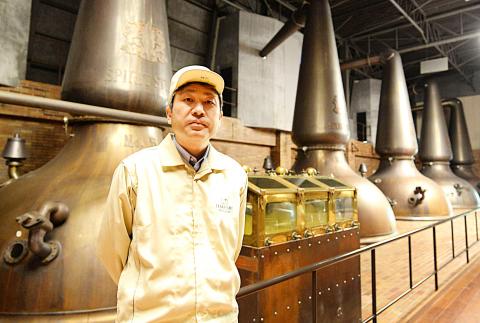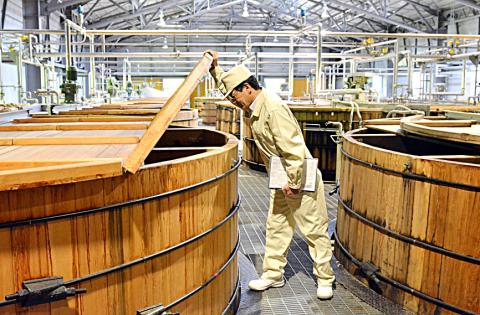When his family business was closing after nearly four centuries of making sake and other spirits, Ichiro Akuto swooped to rescue the doomed distillery’s whiskey stock and went out on his own.
A little over a decade later, the 10-person operation is on a roll with its Ichiro’s Malt scooping up praise from a rapidly growing fan base in Japan and overseas.
“Some of that whiskey had been maturing for 20 years ... and it felt like leaving my children behind,” said the 49-year-old Akuto.

Photo: AFP/kazuhiro
“So I decided to take all that whiskey with me and start a new business.”
Soaring demand for whiskeys made in a country long associated with sake has catapulted Japan into the ranks of the world’s whiskey heavyweights — Scotland, Ireland, the US and Canada — despite having fewer than 10 distilleries, about a tenth of the number in Scotland.
Commercial production has been around in Japan since the 1920’s after a student who learned the art of whiskey making in Scotland helped start the Yamazaki distillery near Kyoto.

Photo: AFP/kazuhiro
But made-in-Japan whiskey was practically unknown overseas even a decade ago until it started picking up a slew of top awards at international spirits competitions, followed by a boom in exports.
When the hammer fell at a rare whiskey auction in Hong Kong last month, the Japanese brands sold out, including a bottle of 50-year-old Yamazaki which went for about US$33,000, well above pre-sale estimates.
“Demand for rare single malt whiskeys and in particular Japanese ones remains at an all-time high,” auctioneer Bonhams said after the sale.
‘Fresh Taste’
About one-third of Ichiro’s Malt is now sold overseas.
But it was a rough beginning as the distillery northwest of Tokyo was faced with declining whiskey consumption at home while making a niche product that was aimed at the palates of bartenders and whiskey lovers, rather than the mass market.
“Our success might have had something to do with that,” Akuto said.
“But at first it didn’t sell at all. The brand wasn’t famous. It took two years to sell the first 600 bottles. Now I sell 600 bottles in a day.”
Yamazaki maker Suntory, a beverage giant which earlier this year bought the US maker of Jim Beam bourbon for nearly US$16 billion, operates the sprawling Hakushu distillery nestled in a mountain-ringed forest with Mount Fuji in the distance.
Suntory — introduced to a global audience by Bill Murray’s character in Lost In Translation — picked up “Distiller of the Year” at the 2014 International Spirits Challenge for the fourth time.
The distinctive green bottle of its award-winning Hakushu gives a nod to the natural surroundings of the distillery.
“To understand Hakushu’s specificities, you need to know why we chose this place for the distillery,” said general manager Takeshi Ono.
“Suntory wanted a place surrounded by rich nature, with plenty of water and green forests. We think this all gives Hakushu its fresh taste.”
The popular brand is among the 300-odd bottles on offer at Zoetrope, a whiskey bar in Tokyo’s bustling Shinjuku entertainment district.
Owner Atsushi Horigami is happy to help out customers keen on sampling his mostly-Japanese collection. But don’t ask him if he has a favored tipple.
“I can’t say what my favorite one is. What I love about Japanese whiskey is that there is so many variations,” Horigami said.
“Generally, they’re smooth and soft, with a sweet touch. But more importantly, they’re really varied. Every distillery produces many types of their own whiskey.”
‘We’re just Maniacs’
Lebanese tourist Abdallah Atie sought out Zoetrope so he could try Ichiro’s Malt and see what all the fuss was about. “Four or five years ago, we could not find any Japanese whiskey in Lebanon,” he said.
“But now, every good bar has two or three kinds. Before that it was only Scotch and American bourbon.”
Zoetrope’s owner reckons that his compatriots’ obsessive attention to detail was the main reason for Japan’s whiskey success.
“There is a culture in Japan of not giving up. When we start something, we don’t stop,” he said.
“People would think you don’t need to put that much effort in it, but well, since we’ve started we might as well do it right — I guess we’re just maniacs.”
Warning:
Excessive consumption of alcohol can damage your health

May 18 to May 24 Pastor Yang Hsu’s (楊煦) congregation was shocked upon seeing the land he chose to build his orphanage. It was surrounded by mountains on three sides, and the only way to access it was to cross a river by foot. The soil was poor due to runoff, and large rocks strewn across the plot prevented much from growing. In addition, there was no running water or electricity. But it was all Yang could afford. He and his Indigenous Atayal wife Lin Feng-ying (林鳳英) had already been caring for 24 orphans in their home, and they were in

On May 2, Chinese Nationalist Party (KMT) Chairman Eric Chu (朱立倫), at a meeting in support of Taipei city councilors at party headquarters, compared President William Lai (賴清德) to Hitler. Chu claimed that unlike any other democracy worldwide in history, no other leader was rooting out opposing parties like Lai and the Democratic Progressive Party (DPP). That his statements are wildly inaccurate was not the point. It was a rallying cry, not a history lesson. This was intentional to provoke the international diplomatic community into a response, which was promptly provided. Both the German and Israeli offices issued statements on Facebook

Even by the standards of Ukraine’s International Legion, which comprises volunteers from over 55 countries, Han has an unusual backstory. Born in Taichung, he grew up in Costa Rica — then one of Taiwan’s diplomatic allies — where a relative worked for the embassy. After attending an American international high school in San Jose, Costa Rica’s capital, Han — who prefers to use only his given name for OPSEC (operations security) reasons — moved to the US in his teens. He attended Penn State University before returning to Taiwan to work in the semiconductor industry in Kaohsiung, where he

Australia’s ABC last week published a piece on the recall campaign. The article emphasized the divisions in Taiwanese society and blamed the recall for worsening them. It quotes a supporter of the Taiwan People’s Party (TPP) as saying “I’m 43 years old, born and raised here, and I’ve never seen the country this divided in my entire life.” Apparently, as an adult, she slept through the post-election violence in 2000 and 2004 by the Chinese Nationalist Party (KMT), the veiled coup threats by the military when Chen Shui-bian (陳水扁) became president, the 2006 Red Shirt protests against him ginned up by